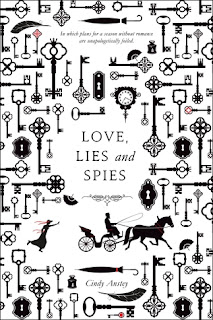Love,
Lies And Spies by Cindy Anstey is about all three,
but perhaps not quite in the way a reader would expect.
Firstly, “Love” – Juliana and Spencer, the
main characters, are very sweet together. The banter between them is intelligent
and charming, from the opening scene in which he rescues her from the
“embarrassing” as well as dangerous position of clinging to a cliff’s side, to
the final marriage proposal. As a research assistant to her scientist father, Juliana has sharp
observational skills that complement Spencer’s talent as a spy. Also, the fact
that they both keep their careers secret helps them relate to each other in
ways their more conventional peers cannot.
However, although they share the
narration, I never really got to know Spencer as a character. Juliana is a
fully fleshed-out teenage girl, complete with quirky habits (lecturing
socialites about ladybugs), insecurities (worries about her clothes, envy of
prettier girls) and flaws (forgetting the world around her, which leads to
accidents such as the cliffside fall). By contrast, all I found out about
Spencer is that he has beautiful blue eyes, works for the War Office, and
rescues Juliana whenever she is in trouble.
Secondly, “Lies” – this romance between a
sheltered girl and a spy involved in a dangerous operation goes much more smoothly
than I expected. The scene in which Spencer finds Juliana’s lost fleur-de-lys pendant and suspects her of
spying for the French seems to promise much more intrigue, misunderstanding and
conflict than actually develops between them. On the one hand, this speaks well
for Juliana’s common sense; where other heroines would sulk and feel insulted
by their hero keeping secrets from them, Juliana quietly puts two and two
together and accepts Spencer’s secrets as part of his job. On the other hand,
it also removes a lot of the suspense from the equation.
Thirdly, “Spies” – Spencer’s work tracking
smugglers and feeding misinformation to Napoleon’s spies is only a small part
of the novel, and one of the least exciting. The author devotes much more time
and energy to shopping trips, house parties, balls and other aspects of a
Regency-era London Season with warmth, humor and (as far as the modern reader
can tell) accuracy. Like her role model, Jane Austen, Anstey is strongly aware
of the significance of body language; Spencer’s silent standoffs with the
boorish Mr. Pyebald are minutely and cleverly described.
However, unlike Austen’s, Anstey’s language
is sometimes awkward. The Regency-era slang terms such as “gullgropers”,
“havey-cavey” or “Friday-faced” (included in a glossary at the back of the
book), as funny, brilliant, and painstakingly researched as they are, distract
from the flow of the story. Also, some of the sentences are more complicated
than they need to be: “Your situation is proceeding into the realms of peril,”
Spencer tells Juliana while she is dangling from the cliff.
The author’s love for, and fascination
with, early 19th-century England is obvious on every page. She loves
the language, the culture and the fashions of that world, and even its
hierarchies and restrictions, if only to gleefully break them. (I won’t tell
you whom Juliana punches in the face,
only that I found it very satisfying.) If this love occasionally carries her
away, it’s a mistake I find all too easy to understand - having made it myself
every time I open a good book, no matter what time it’s set in.

No comments:
Post a Comment